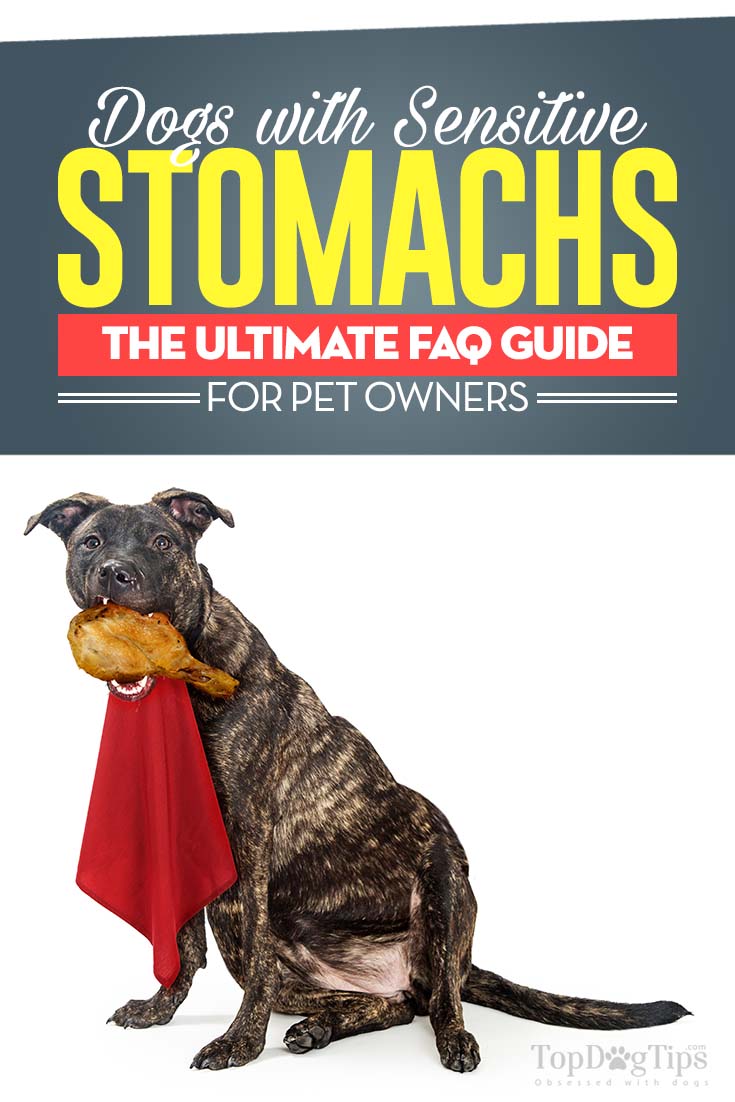Your dog has been having a lot of gas lately. It’s hard not to notice. You can hear the grumbling going on loudly in its stomach as you lay on the couch together. Not only that, on occasion, your dog has been yacking up his breakfast all over the kitchen floor then spending the rest of the day lying around the house. It doesn’t seem to be an everyday thing, but you did mention it to your friend on the phone who swears you're dealing with dogs with sensitive stomachs.
Do dogs actually suffer from sensitive stomachs? Can't they eat virtually anything and digest it? I mean, we are talking about creatures who eat everything from tennis balls to other animals feces.
Until now, you were under the impression that your dog was a walking garbage disposal the way he would clear his dish then come back to clear yours. But, now he's having some obvious digestive issues and you find him outside eating the grass all the time.
What could all of this mean?
A sensitive stomach is basically a generic term. It could mean almost anything. It can range from vomiting to diarrhea, and can include excess gas. It’s very common for dogs with sensitive stomachs to suffer because they have eaten something that they shouldn't have.
MORE DETAILS: 9 Tips On How To Feed A Dog with Sensitive Stomach
Dogs with Sensitive Stomachs
FAQs and what you should know
Does My Dog Have a Sensitive Stomach?
Some dogs can eat almost anything. You find them getting in the garbage can, tearing through leftovers, and even in the cat litter. So how can a dog have a ‘sensitive stomach?’
Many dogs’ digestive systems cannot handle variety. They cannot eat items in their diet like that chili cheese dog followed by licking the ice cream bowl. That will make their digestive systems work on overload.
Since no dog should be eating junk, if you suspect your dog has a sensitive stomach you should start with looking at its diet. Cut out all the table food.
Try to make sure that your dog’s food is a highly digestible one with high protein and low fat. You can even try a simple diet of rice and chicken and work your way into a good type of dog food as your dog’s stomach problems subside.
If your dog’s symptoms are constant or do not improve, you need to call the veterinarian and get a checkup right away. Dogs with sensitive stomachs could actually have a more serious health condition. If you think your dog has a sensitive stomach, then he may be showing some of the following signs:
1. Occasional vomiting
If your dog if vomiting only occasionally then it may be a sensitive stomach. If there are other signs or symptoms like lethargy, diarrhea, excessive tiredness, you should call the veterinarian right away.
2. Loose stools
This is a normal sign of a sensitive stomach. It can also be a sign of a recent change in diet. Consult your veterinarian if it is consistent and does not seem to clear up.
3. Flatulence
Dogs often gulp too much air as they eat. They can do this by eating too quickly. Gas can also be a sign of some gastrointestinal illnesses. Try walking your dog right after eating to reduce the gas problems your dog is having.
4. Eating Grass
Your dog likes to eat grass because it is soothing to the stomach. They may even have a favorite patch in the yard. The issue is that the blades of the grass often cause vomiting as a result.
The Facts about Dogs with Sensitive Stomachs
 Dogs that have funny tummies are not to be ignored. While ‘sensitive stomach’ usually means a mild stomach upset, your dog could have any one of many serious illnesses.
Dogs that have funny tummies are not to be ignored. While ‘sensitive stomach’ usually means a mild stomach upset, your dog could have any one of many serious illnesses.
Vomiting, diarrhea and gas are all signs of serious illness that require veterinarian attention. The facts are it could be any one of the following ailments or conditions:
- parasites
- bacterial infection
- fungal infection
- inflammatory bowel disease
- Addison’s Disease
- gastrinoma
- ingesting a foreign body or toxin
- pancreatitis
- stomach ulcers
Your veterinarian can do a full examination of your dog, including stool samples and a full blood count. This will help determine the cause of dogs with sensitive stomachs and rule out any serious disease as a cause. Once the cause is determined, you can then find a treatment plan that will work for your dog and its tummy troubles.
RELATED RECIPE: Chicken & Rice Cakes for Dogs with Upset Stomach
FAQs about Dogs with Sensitive Stomachs
1. What is easy on a dog’s stomach?
Many foods can be easy on a dog’s upset stomach. Try a simple home prepare chicken and rice meal, this is especially easy on a dog’s stomach. When looking for commercial dog food, try to understand what parts of the food can cause problems for dogs with sensitive stomachs, including:
Protein sources – Chicken is sometimes harder to digest. Try switching to a different protein source like lamb, beef, or fish.
Fiber sources – Dogs can need a little fiber too. Beet pulp is recommended.
Fat content – High fat diets are harder to digest. Check your labels, see if fats and oils are listed in the top four ingredients. If so, then your dog food may have too much fat.
Vitamins and minerals – Most dog foods contain a fortified vitamin and mineral supplement. If your dog is already on a special diet and still having problems, it could be that your dog is vitamin deficient and needs to have vitamins and minerals added to its food. Talk to your veterinarian.
Quality of ingredients – This is more difficult as manufacturers are not permitted to post the grade of ingredients on their labels. You can contact the manufacturer directly.
Now that you have so many things to look for and watch out for in trying to find something that’s easy for your dog’s sensitive stomach, you may want to try to ask a veterinarian nutritionist. He or she may be able to direct you to the right brand or food for your dog.
2. Why does my dog eat grass?
Dogs need a wide variety of nutrients in their diets, and through evolution have become somewhat of scavengers for food sources. In the wild, science has proven how canines are known to eat whatever they can find including fruits, berries, and other vegetables.
Your dog, and most domesticated dogs, will find their favorite patch of grass because it’s right there within reach. Many dogs have discovered over time that gulping grass rather than chewing can cause enough stomach upset to cause them to vomit. For dogs with sensitive stomachs, this makes them feel better. If your dog starts eating a lot of grass, then its best to see the vet, your dog may be trying to self-medicate a stomach problem.
3. Why does my dog always vomit right after eating?
Vomiting in dogs can be the digestive systems’ way to correct a potential mistake. There are many serious conditions that vomiting can be a symptom of and persistent vomiting should always be seen by a veterinarian right away.
If your dog has only vomited once or twice, and on the other hand seems to be unaffected, you can follow this basic home remedy:
- No food or water for 6 – 8 hours.
- If during that time, your dog has no stomach issues – reintroduce water slowly.
- When your dog has progressed to holding down water, and it’s been approximately 12 hours or more, then offer small meals of boiled white meat chicken and rice. Be sure to remove bones and skin.
- Slowly reintroduce regular dog food at meal times.
READ NEXT: 15 Best Sensitive Stomach Dog Foods for Upset Stomachs














